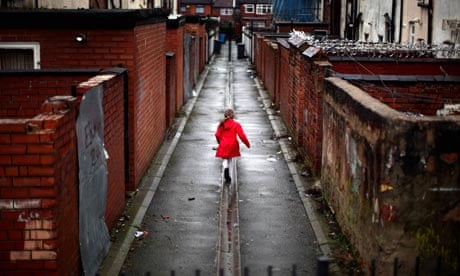A key government adviser on wellbeing and fairness will warn on Wednesday that cuts to children's services at the same time as increasing taxes on the poor are of deep concern and could exacerbate already high levels of inequality.
Professor Sir Michael Marmot, whose work on health inequalities in 2010 has been incorporated into the government's public health reforms, said: "Cutting services has a selective impact the lower down you go in the social hierarchy.
"We see increases in child poverty and are moving from direct to indirect forms of taxation, which are regressive. I am really concerned about these things and their impact [on inequalities]."
Marmot said on the six measures that affect health – relating to employment, education, income and health, child development and environment – he was "not sanguine that we are doing enough on any of them".
Although he said there was around a three point improvement in the percentage of 5-year-olds achieving a good level of development between 2010 and 2011 – from nearly 56% to 59% – this left almost 250,000 children failing to meet the standard set by schools. Such tests include being able to dress, concentrate, and the ability to speak and recognise words.
Marmot said this was evidence that Britain was failing its young children on a grand scale owing to inequality, with many not achieving basic levels of social and emotional development.
He added that Nordic counties such as Finland, Denmark and Sweden showed a much smaller gap between rich and poor children in terms of happiness as well.
"We do really, really badly on international comparisons, really badly," he said. "One of the best things we can do and one of the best trends in policy in Britain had been focused on early childhood. So my concern is that we preserve what we've done."
Ministers confirmed in November that there were 124 fewer Sure Start centres for children than when the coalition formed, but said many of the reductions were owing to "streamlining" of services.
But Marmot said the evaluation of Sure Start programmes was "ambiguous", but added: "If Sure Start performed in a very mixed way – better in some areas than others – the response should not be to throw it out but to learn from the best and build on that. I have concern that we must not cut good services for early childhood."
He warned that although life expectancy was rising, it remained linked to social standing and the poor die sooner. This meant that while average life expectancy at birth in England increased by 0.3 years for both men and women between 2007-09 and 2008-10, the gap widened between the top and bottom decile in society in two-thirds of the 150 local authorities.
The effect means that in Westminster, London, people now have a life expectancy at birth of 84 years. But the richest in the borough would live almost 17 years longer than the poorest. This effect can be seen in poorer areas such as Middlesbrough, where average life expectancy is 76 years but the wealthiest citizens of the town live nearly 15 years longer than the poorest.
Lower life expectancies in the UK are not just about poverty but affluence and expectation. Poorer people are at greater risk of diseases related to inadequate diets, lack of exercise, smoking, poor pay, and job insecurity.
"If you are unemployed you do not get ill because of money. It is because you get depressed, you drink, you become abusive," Marmot said.
He warned that the government's plan to hand councils £2.2bn once they take over public health next April could penalise local authorities in poor areas.
Ministers, he continued, had decided to pay extra to councils that showed "improvements in tackling health inequalities". "The lack of improvement may be because of laziness or incompetence. Or because it is much harder to improve because of deprivation. I hope the government does not end up punishing people because of deprivation."
The public health minister, Anne Milton, said: "It is great that pPeople are living longer but we know that much more must be done to narrow the gap of health inequalities. This is one of the driving forces behind our reform of the public health system. Health inequalities are caused by a complex web of factors and need a cross-cutting approach at every level of government. That is why we are giving councils the power and the budget to tackle public health."
A spokesman for the Department for Education pointed out that next year there would be £1.25bn in spending via the pupil premium: "We have ensured there is enough money in the system to maintain a network of Sure Start services across England – available to all, but focused on the most disadvantaged."
